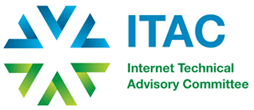The Internet Technical Advisory Committee (ITAC) to the OECD brings together the counsel and expertise of technically focused organizations, in a decentralized and networked approach to policy formulation for the Internet economy. The main purpose of ITAC is to contribute constructively to Internet-related policies developed in the OECD. It mostly contributes to the work of the OECD Committee on Digital Economy Policy (CDEP) and its specific working parties such as the Working Party on Communications and Infrastructure Services Policy (CISP) and the Working Party on Security and Privacy in the Digital Economy (WPSDE).
Table of Contents
Editorial: Towards an Internet for social and economic progress
By Constance Bommelaer Senior Director, Global Policy Partnerships, and Carl Gahnberg, Policy Advisor, The Internet Society
Guest article: OECD 2016 Ministerial: Meeting the policy challenges of tomorrow’s digital economy
By Josie Brocca, Policy Research and Advice, OECD
Building Blocks for Informing Data Public Policies to Enhance Privacy
By Karen McCabe, Senior Director Technology Policy and International Affairs, IEEE Standards Association
By Nigel Hickson, Vice President for Europe, ICANN
Identification: A Critical Enabler of Societally Beneficial Economic Growth
By Kenneth Dagg, Chair Identity Assurance Work Group, Kantara Initiative
Taking stock of privacy in APEC
By Christine Runnegar, Director of Public Policy, The Internet Society
Previous Newsletters
Newsletter N°1
Newsletter N°2
Newsletter N°3
Newsletter N°4
Newsletter N°5
About This Newsletter
ITAC provides an avenue for new technical insights to contribute to the work of the OECD. ITAC is open to any Internet technical and research organization that meets the membership criteria listed in the Committee’s Charter.
ITAC encourages Policymakers, members of Civil Society and Businesses to submit queries regarding any of our work to [email protected]
If your organization is interested in joining ITAC and contributing with technically informed advice to the OECD’s development of Internet-related policies, we invite you to visit our website: http://www.internetac.org, to read the “Criteria for Membership” in ITAC’s Charter (Section III).
For further information on ITAC, please contact us at [email protected]








